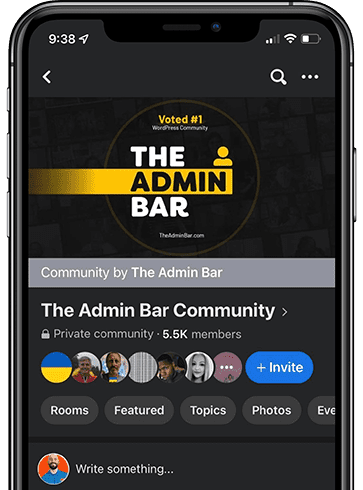As a professional web designer and developer, you pour everything you’ve got into your website builds. It’s a huge investment of time, energy, and creativity – a point of personal pride that shines through each one of your projects.
So, when some random person comes snooping around from the dusty corners of the internet and steals your work, it’s justifiably very annoying and upsetting. For many, that’s the understatement of the year – it can be soul destroying.
Taking inspiration from what your peers are doing is absolutely fine. In fact, it’s a good thing.
But flat-out stealing and benefiting from someone else’s hard work is a big no-no!
They’ve gone beyond borrowing your custom button shadowing and have indeed stolen your entire website – using the same plugins, animations, fonts, copy, and design layouts. All that’s missing is a wiry handlebar mustache to twiddle menacingly as they cackle at getting away with their thievery.
Before you start to doubt yourself, no, it’s not just a coincidence, and someone didn’t miraculously have the very same design thoughts and process as you.
You know they stole it, because even the site credit link from your client’s website has been copied over. (Yes, this happens a lot)
Firstly: I’m so sorry that you’re in this situation. It truly sucks. But it must be said that imitation (or outright copying) is the highest form of flattery. So, at least it means you’re doing absolutely show-stopping work! Which, we already knew. But sometimes it’s nice to get that extra little reminder in the form of someone stealing your work, right? 😅
In this blog post, we’ll explore whether it’s worth taking action when one of your website builds has been stolen, and what to do if you choose to take them on.
Should you do anything when someone has lifted your entire site?
So someone has stolen your work. Is there actually any point in doing something about it?
Truth is, it’s kind of a personal choice, and there are a few things you should consider before you make your decision.
First, it’s important to ask yourself whether you have the time, money, and energy to get involved. Is the site worth the fight?
On one hand, if they’ve credited your website, website visitors might reach out to you to do their build if they like your work. (Although I’m not sure how often those kinds of referrals come around.)
On the other hand, if the copy they’ve used on the infringed site is terrible, and they’re crediting you for its build, it might reflect poorly on you as a web developer.
When you’re dealing with web content theft, it’s worth considering whether they’re likely to steal SEO from your clients too, affecting the performance of your work. If your target audience is going to come across the stolen website before your website on Google search, it’s certainly not a good thing.
Plus, duplicate content may offend the almighty search engines (because they most certainly do not like copied and pasted online content), possibly damaging your website’s SEO score. Another not-good SEO thing to come out of this whole mess!
You’ve got valuable content on your website, and you put a lot of time and effort into creating it, so it’s your right to want to protect it.
Ultimately, there’s no right or wrong response to learning someone has stolen your website. But if you do choose to go down the road of getting the offending website removed, here’s where to start.
How you can respond to website theft
- Gather evidence of the theft
- File a takedown notice with the Digital Millennium Copyright Act (DMCA)
- Reach out to the website owner
- Get legal advice
- Expand your service offerings beyond what can be copied
1. Gather evidence of the theft
First things first. You’ve discovered and confirmed that someone has stolen your blood, sweat, and tears in the form of an expertly-crafted website build.
The initial response may vary, but you may experience extended bouts of screaming at your laptop, pacing around the office spitting “why I oughtas”, often followed by silent tears while gazing out the window as rain cascades down the pane.
Once you’ve gotten that out of your system (an essential part of the process), it’s important to transform yourself into Agatha Christie’s Poirot and document all the evidence you can find of the theft. (Questionable Belgian accent optional.)
Take plenty of screenshots of the stolen website. Make sure to include URLs, the source code, all stolen content, and anything else that proves it’s your intellectual property and work that’s been lifted. Note the date and time of the screenshots and who they were taken by.
Don’t forget to save copies to your Google Drive and print them out to be extra safe!
This documentation will be extremely valuable to you. You can use it as evidence to present to the client the website belongs to, or you can use it to report the theft to the relevant authorities.
2. File a takedown notice with the Digital Millennium Copyright Act (DMCA)
The Digital Millennium Copyright Act (DMCA) was established to protect and support professionals just like you who have had online content stolen.
The platform allows you to flag stolen website content as the copyright owner, and to request the infringing content be removed from the internet by issuing an official DMCA complaint.
Once you’ve noticed stolen content, file a DMCA takedown notice with the website hosting provider, search engines, and any other platforms the stolen content has been published on.
Make sure you include the evidence you gathered when completing your notice, along with all documentation and proof of ownership so they can start the process of taking down the stolen content.
It’s important to note that you have to pay for the service of filing a notice and getting the content removed, so even a rightful takedown is not without its costs. Unless they can’t get the content taken down for you, in which case you get your money back!
3. Reach out to the website owner
While you’ve probably just spent the past 90 minutes absolutely seething, the company that actually owns the stolen website might not even know it’s stolen.
Remember, the real thief here is the person they hired to do the website build for them – not the site owner.
Sometimes, if you’re lucky, letting them know their own site is just a ripped version of someone else’s is all it takes to turn things around. But if they don’t respond, or are refusing to act, here’s what you can do.
First, let them know that they’ll be receiving a letter from your lawyer regarding the theft of your client’s website.
Then, ask them to remove the site from the internet. It’s important that they provide evidence of actually destroying the website, as opposed to simply taking it down for a few days in the hopes you won’t notice it going live again once it’s all blown over.
You can also advise them to fire the company they hired to create their website. The thieving site builders are the ones at fault here, and they’ve likely been lying to their clients, claiming they did the work themselves and charging them for services they didn’t even receive.
Depending on how this interaction goes, you may need to follow through with the next step.
4. Get legal advice
Ok, so you’ve exhausted all avenues with the site owner to no avail, which unfortunately means it’s time to get a legal team involved.
If the website thief is outright refusing to admit fault or cooperate, you’re not really left with any choice other than to make it a legal matter.
While watching Law & Order is fun, actually dealing with this stuff in real life? Not so much. Still, it’s super useful to have the insight and support of a trained and experienced professional at your disposal when dealing with a difficult situation that could ultimately harm your business if left unresolved.
Laws surrounding more abstract concepts like intellectual property (which your website build is) can be quite complex and sometimes a little gray.
Having a skilled lawyer you can trust by your side will prove extremely valuable. They’ll help you understand your rights as a creator and protect your business by taking appropriate action against the perpetrator.
Depending on the situation you’re dealing with, you may be able to make a case for false claims and fraud, which should strengthen your position. (Caveat: I am very much not a lawyer! Always consult with the real pros on these sensitive matters.)
Contact your website hosting company to see what kind of legal protection (if any) they provide in these circumstances.
5. Expand your service offerings beyond what can be copied
Unfortunately, the nature of publishing your work in a public medium means your fantastic work is exposed to the potential of theft, which is a total bummer.
But you can still apply your incredible work ethic and unparalleled skills in ways that can’t be copied and pasted. Definitely not a bummer!
While designing and building websites might be your passion, consider branching your services out a little bit to protect your business in the long run. After all, broadening your skills and extending your potential reach is always a good thing!
Think of other ways you can provide direct, measurable value to your clients. You could offer business or marketing strategies, targeted sales funnels, conversion rate optimization, or just about anything else you’re good at or enjoy doing that can benefit your clients.
These tasks require your skill and expertise and are done on an individual basis, so thankfully, there’s no fear of this work getting stolen!
Especially now with the rise of people building (often dodgy and stolen) websites on the cheap, some people are going to turn to the cheapest option when they’re looking to get a website made for their online business.
Ultimately, these websites are going to do them more harm than good. Eventually, they’ll need to look to a professional like you to help get them back on track and overhaul their website so it actually performs and helps them reach their business goals.
The bottom line is, don’t let a website theft set you back. Sure, it’s incredibly frustrating, and no one deserves to profit off of your hard work.
But you’ve got to do what you’ve got to do, then dust yourself off and keep moving forward. It’s clear that you’re good at what you do. So don’t let a little weasel somewhere on the other side of a screen get you down.
Continue the conversation with The Admin Bar community
If one of your websites has just been stolen, trust us, you’re not alone.
We’re an online community of agency owners, freelancers, and digital marketing nerds. Some of us have had an entire website ripped, while others have had designs copied. Moral of the story is – we’ve seen it all.
Join our Facebook group to talk to other like-minded professionals, hear about their experiences with website theft (among other things), and get some incredibly valuable peer advice.
We can’t wait to hear from you!






